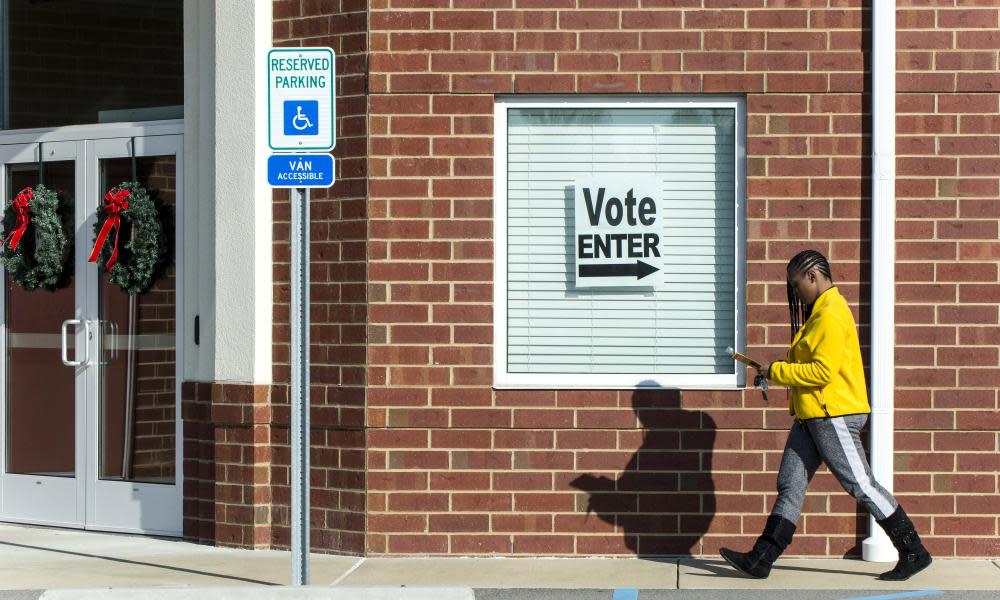Alabama showed Black Voters Matter. So what now? | Cliff Albright and LaTosha Brown

As co-founders of Black Voters Matter Fund, we envisioned an organization that could support voter mobilization primarily in black and marginalized communities, provide organizational development support for social justice organizations and when necessary utilize independent expenditures in support of progressive candidates.
As the runoff election for the Alabama Senate seat previously held by Jefferson Sessions approached, it became clear that although millions of dollars had been raised, few resources were reaching the communities that we believed would have to turn out in large voting numbers in order to defeat Roy Moore, a candidate who pined for the slavery era.
In response, we launched the Alabama Grassroots Mobilization Project and in one week raised enough funds to put “boots on the ground” in 18 Alabama counties. Our support included mini-grants to over 30 local community-based organizations to get out the vote in their communities, stipends for roughly 400 paid organizers, transportation assistance, T-shirts and other printed materials.
Our efforts were by no means in isolation. Our project was part of a layered approach which saw several other partner organizations playing critical roles. It was with special pride that we watched the final voting precinct tallies being announced, as all eyes in the nation were on cities such as Birmingham and Mobile, and rural black belt counties such as Dallas and Hale – counties that most people in the country had never heard of in spite of their pivotal role in birthing, through bloodshed, the 1965 Voting Rights Act.
Experts believed that the only reason black voters had historic turnout in 2008 and 2012 was because Barack Obama, a black presidential candidate, was on the ballot. They were wrong.
Instead, what we witnessed was record breaking turnout, as black residents accounted for an estimated 29% of voters, outperforming their share of the state’s population. In short, the black community was the most motivated segment of the voting population. After giving 96% of its votes to Doug Jones, the black community was clearly the difference maker in this historic election.
Now that the election is over, several challenges remain. Regarding Alabama and its newly elected senator, Doug Jones should now be keenly aware that black voters matter at the polls. The question is whether he will demonstrate that black voters also matter in terms of policy.
The nature of the Roy Moore campaign, with his refusal to participate in debates, left little room for robust policy discussions. As a result, Jones offered few policy details to black voters, who now must seek to hold him accountable without much on which to base that accountability.
It is our hope that the communities and organizations that help lift Doug Jones to victory will engage in a process to define policy interests and legislative actions they expect from Jones. It is also our hope that Jones will facilitate such a process through listening sessions, town hall meetings, people’s assemblies or other mechanisms. As an organization, we will be seeking ways to support such a process.
Beyond Alabama, as the 2018 mid-terms and several key gubernatorial races take shape, we believe that there are at least three key lessons learned that candidates and political parties must keep in mind.
First, candidates and parties must accept not just that black voters matter, but that black voters matter everywhere, including in rural counties with relatively small population sizes. Just as there is increasing discussion, within both parties, of so-called “50 state strategies” in presidential elections, candidates and parties in statewide elections must value all black voters, wherever they may be.
Second, it is critically important that candidates, parties and the progressive community invest in existing community-based organizations. Doing so allows those who best understand their communities to implement strategies that are most likely to be effective. Moreover, such investments can create benefits that extend far beyond election day as organizations continue to fight for social justice after all of the political operatives and media have left.
Third, candidates, parties and the progressive community must stop waiting until a week or two before an election to start mobilizing black voters. Such late support sends a clear message to black communities: the candidates and/or political parties are not truly interested in black community efforts throughout the year. The relationship is merely transactional. And then, after sending such a message, candidates and parties are surprised when they don’t get the turnout they had hoped for.
Last, but certainly not least, we must recognize that black women had the greatest turnout numbers and impact in the Alabama race, and the three major voter turnout operations – Black Pac, #WokeVote and Black Voters Matter – were led by black women. The progressive community must learn to trust and invest in black women.
The Black Voters Matter Fund looks forward to sharing these lessons and discussing them with anyone who is truly interested in helping marginalized communities to control their own destinies. It is our firm belief that when candidates and elected officials demonstrate that black voters matter, entire cities, states and the country as a whole will benefit from the progress.
LaTosha Brown and Cliff Albright are Co-founders of Black Voters Matter Fund

 Yahoo News
Yahoo News 
